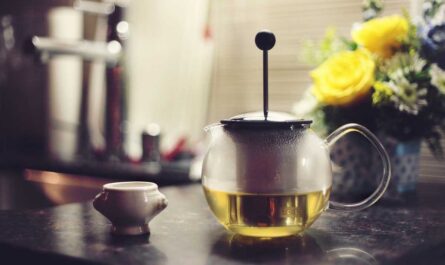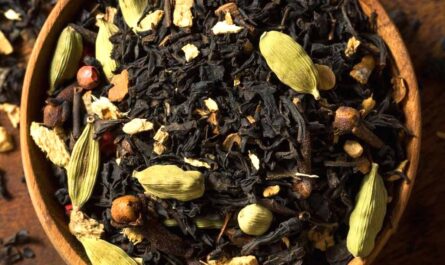Can tea boost your immune system? The familiar scratch in your throat, the tell-tale achiness in your limbs – that unmistakable feeling of a cold brewing beneath the surface. You instinctively reach for the kettle, the comforting warmth of a steaming mug beckoning. But as you settle in with your cup of tea, a question arises: is this a soothing ritual or a potential path to immune system salvation? Can tea truly bolster your body’s defenses against those pesky invaders?
This article dives into the intriguing world of tea and its potential impact on our immune system. We’ll embark on a balanced exploration, examining the science behind specific tea types and their purported immune-supporting properties. But our journey won’t stop there. We’ll also delve into the complex world of the immune system itself, recognizing the multifaceted approach necessary for optimal health. Finally, we’ll unveil practical tips for incorporating tea into your daily routine alongside other well-being practices.
So, settle in with your favorite cuppa, and let’s embark on this exploration together. We’ll explore the following:
- Unveiling the Wonders of the Immune System: We’ll begin by understanding the intricate network that safeguards our health, the immune system.
- A Tea for Every Need? We’ll delve into the world of tea, exploring different varieties and their potential benefits for immune health.
- Beyond the Mug: We’ll acknowledge the importance of a holistic approach to well-being, recognizing the role of lifestyle factors in immune function.
- Brewing a Healthy Habit: We’ll provide practical tips for incorporating tea into your daily routine for optimal health.
- A Balanced View: We’ll address potential limitations and misconceptions surrounding tea and immune function.
- Where to Learn More: We’ll conclude with resources for further exploration of tea and its potential health benefits.
This journey won’t provide definitive answers, for the intricacies of the human body and the power of plants are vast and ever-evolving. But it will equip you with the knowledge to make informed choices about incorporating tea into your well-being routine, alongside a healthy lifestyle. So, let’s sip, explore, and empower ourselves with the knowledge of this ancient beverage.
The Body’s Defense Network: Understanding the Immune System
Imagine your body as a mighty castle, and the immune system is its complex network of defenses. Just like a well-fortified castle has multiple layers of protection, the immune system employs a multifaceted approach to safeguard our health. Understanding how this remarkable system functions is the first step to appreciating the potential benefits of tea and its role in supporting our overall well-being.
A Multifaceted Shield: A Complex Network in Action
The immune system is an intricate dance of cells, tissues, and organs working together to protect us from a vast array of invaders. These invaders can be microscopic foes like viruses and bacteria, or even larger parasites. The immune system’s job is to identify these threats, neutralize them, and prevent them from causing harm. It’s a constant vigil, a silent war waged within us to keep us healthy.
First Lines of Defense: The Body’s Outer Walls
Think of the castle walls as the first line of defense for our immune system. Our skin, the largest organ of the body, acts as a physical barrier, constantly working to shield us from external threats. Mucous membranes, lining our respiratory and digestive tracts, trap and eliminate pathogens before they can enter the body. These physical barriers are our first line of defense, a crucial layer of protection that prevents many invaders from ever gaining a foothold.
Adaptive Immunity and Memory: Building Defenses and Remembering Threats
But the immune system doesn’t stop at just physical barriers. It also boasts a remarkable ability to adapt and develop specific defenses against encountered pathogens. This is the realm of the adaptive immune system, a sophisticated network of white blood cells like lymphocytes that can recognize and target specific threats. When a new pathogen enters the body, the adaptive immune system goes into action, creating specialized antibodies that can disable and eliminate the invader. This process takes time, which is why we may experience symptoms like fever or fatigue during an infection – it’s the body’s way of fighting back.
The beauty of the adaptive immune system lies in its memory. Once it has successfully combated a particular pathogen, it remembers the specific signature of that threat. This immunological memory allows the body to mount a quicker and more targeted response if it encounters the same pathogen again in the future. This is the principle behind vaccination – by introducing a weakened or inactive form of a virus or bacteria, we can train our immune system to recognize and combat it effectively, preventing future infections.
A Cup of Potential: Exploring Tea Types and Immune Support
For centuries, tea has been a cornerstone of traditional wellness practices around the globe. But beyond its comforting warmth and inviting aroma, could this beloved beverage hold the key to supporting a healthy immune system? Let’s delve into the fascinating world of tea and explore the potential immune-boosting properties harbored within different tea varieties.
Black Tea’s Powerhouse: A Fortified Defense System
Black tea, the robust and full-bodied champion of the tea world, might offer more than just a satisfying morning pick-me-up. Studies suggest that black tea may hold potential benefits for immune health thanks to the presence of certain compounds. Here’s why black tea deserves a spot in your wellness routine:
-
Theaflavins and Theaflavins-3-gallates (TFs): These fancy-sounding names represent powerful antioxidants found abundantly in black tea. Antioxidants help combat free radicals, unstable molecules that can damage cells and contribute to inflammation. By reducing inflammation, TFs may play a role in supporting a healthy immune response.
-
Anti-inflammatory Effects: Research suggests that black tea consumption may have anti-inflammatory properties. Chronic inflammation has been linked to various health concerns, and reducing inflammation may contribute to overall immune function.
It’s important to note: While these initial studies are promising, more research is needed to fully understand the impact of black tea consumption on the immune system.
Green Tea’s Treasure Trove: A Multifaceted Approach to Wellness
Green tea, with its delicate flavor profile and vibrant green hue, is another contender in the realm of immune-supportive beverages. Green tea boasts a rich treasure trove of health-promoting compounds, and some may play a role in bolstering your body’s natural defenses:
-
Epigallocatechin gallate (EGCG): This superstar antioxidant found abundantly in green tea has been the subject of numerous studies exploring its potential health benefits. EGCG exhibits antiviral and immune-modulating properties, suggesting it may play a role in regulating the immune system’s response to potential threats.
-
A Multifaceted Approach: Green tea’s potential immune support likely stems from a combination of factors beyond just EGCG. The presence of other antioxidants, vitamins, and minerals may work synergistically to create a holistic effect that benefits overall immune health.
Similar to black tea, more research is required to definitively establish the impact of green tea consumption on the immune system. However, the ongoing exploration into green tea’s potential health benefits is certainly encouraging.
Herbal Infusions and Wellness: A World of Botanical Bounty
The world of herbal teas extends far beyond the realm of black and green tea, offering a vast array of options for those seeking natural wellness support. Here are a few examples of herbal infusions that have traditionally been used to promote immune health:
-
Ginger Tea: Ginger, a commonly used culinary spice, also boasts a long history of medicinal use. Ginger tea is known for its anti-inflammatory properties, which may contribute to a healthy immune response. Additionally, ginger may help soothe a sore throat or ease nausea, common symptoms associated with colds and flu.
-
Elderberry Tea: Elderberry has been used in traditional folk medicine for centuries. While scientific evidence is still emerging, some studies suggest that elderberry may help shorten the duration of colds and flu symptoms. Elderberry tea offers a delicious and potentially immune-supportive way to incorporate this traditional remedy into your wellness routine.
It’s crucial to remember that herbal teas are not a replacement for medical advice. If you are experiencing any health concerns, always consult with a qualified healthcare professional.
The Importance of Research: A Journey of Discovery
The science behind tea’s impact on the immune system is a fascinating work in progress. While some studies suggest potential benefits, more research is needed to draw definitive conclusions. This ongoing exploration allows scientists to delve deeper into the complex interplay between tea consumption, immune function, and overall health.
As research continues to shed light on the potential of tea for immune support, one thing remains clear: tea offers a delicious and comforting way to embrace a holistic approach to wellness. So, the next time you reach for a steaming cup of tea, savor not just the flavor and aroma, but also the potential health benefits it may offer.

Beyond the Brew: Lifestyle Factors for Optimal Immunity
Sipping a warm cup of tea can be a comforting ritual, but can it truly boost your immune system? The answer, like most things in health, is complex. While tea may offer some potential benefits, a holistic approach to immune health is essential. Let’s explore the role tea might play alongside other crucial lifestyle factors that contribute to a strong and resilient immune system.
Diet and Nutrition: The Foundation of Immune Health
Imagine your immune system as a mighty army, and the food you eat as its arsenal. A balanced and nutritious diet rich in fruits, vegetables, and whole grains equips your immune system with the essential vitamins, minerals, and antioxidants it needs to function optimally.
-
Fruits and Vegetables: These vibrant powerhouses are packed with disease-fighting vitamins, particularly vitamin C, which plays a vital role in immune cell function. Think of citrus fruits like oranges and grapefruits, or brightly colored berries like strawberries and raspberries, bursting with vitamin C to support your immune troops.
-
Whole Grains: Whole grains provide a sustained source of energy for your immune system’s soldiers. Brown rice, quinoa, and whole-wheat bread are excellent choices, offering complex carbohydrates and fiber to keep your immune system functioning at its best.
-
Lean Protein Sources: Protein is the building block of life, and it’s essential for creating and maintaining immune cells. Lean protein sources like fish, chicken, beans, and lentils provide the necessary amino acids to keep your immune army strong.
Remember: Variety is key! A well-rounded diet that incorporates a diverse range of colorful fruits, vegetables, and whole grains provides your immune system with the full spectrum of nutrients it needs to thrive.
Regular Exercise and Sleep: The Body’s Natural Defenses
Think of exercise as a training program for your immune system. Regular physical activity helps to improve circulation, which allows immune cells to move throughout the body more efficiently, identifying and eliminating potential threats. Here’s how exercise can benefit your immune system:
-
Increased Blood Flow: Exercise gets your heart pumping, which increases blood flow throughout your body. This improved circulation allows immune cells to travel more effectively, patrolling for and eliminating pathogens (disease-causing germs).
-
Stress Reduction: Exercise is a natural stress reliever, and chronic stress can have a negative impact on your immune system. A brisk walk, a jog in the park, or a dance session to your favorite music can all help to reduce stress hormones and keep your immune system functioning optimally.
Sleep, the body’s natural rest and repair system, is another critical player in immune health. While you slumber, your body produces cytokines, proteins that help regulate the immune system and fight inflammation. Aim for 7-8 hours of quality sleep each night to allow your immune system to recharge and be ready to face the day.
Stress Management Techniques: Cultivating Calm for a Stronger Immune System
Chronic stress can wreak havoc on your immune system. When you’re constantly stressed, your body produces hormones like cortisol that can suppress immune function. Here are some tips for managing stress and creating a calmer, more immune-supportive environment:
-
Relaxation Techniques: Activities like yoga, deep breathing exercises, and meditation can all help to quiet the mind and reduce stress hormones. Find a relaxation technique that works for you and incorporate it into your daily routine.
-
Mindfulness Practices: Mindfulness involves focusing your attention on the present moment without judgment. Taking a mindful walk in nature, spending time in quiet reflection, or engaging in activities you enjoy can all promote feelings of calm and well-being, reducing stress and supporting your immune system.
-
Supportive Relationships: Strong social connections are essential for overall health and well-being. Spending time with loved ones, talking to a trusted friend, or joining a support group can all help to reduce stress and create a sense of belonging, which can positively impact your immune system.
Remember: Stress management is a personal journey. Experiment with different techniques and find what works best for you to cultivate a sense of calm and promote a healthy immune system.
By incorporating these essential lifestyle factors – a balanced diet, regular exercise, adequate sleep, and healthy stress management techniques – alongside your tea-drinking rituals, you can create a holistic approach to supporting your overall well-being and fostering a strong and resilient immune system.
Brewing a Healthy Routine: Practical Tips for Tea Consumption
Sipping a steaming cup of tea – it’s a ritual steeped in tradition, a moment of comfort and warmth. But beyond the soothing taste and inviting aroma, tea offers a treasure trove of potential health benefits, particularly when it comes to supporting a healthy immune system. While it’s important to remember that tea isn’t a magic bullet for overall health, incorporating it into your daily routine alongside a balanced diet and healthy habits can be a wonderful way to give your immune system a helping hand. Let’s delve into some practical tips to maximize the potential health benefits you can reap from your daily cup (or two!) of tea.
Choosing Quality Tea: Sourcing the Best for Your Brews
Just like any other ingredient, the quality of your tea leaves significantly impacts the potential health benefits you can derive from them. Here’s why opting for high-quality tea leaves is a wise choice:
-
Freshness Matters: Fresh, loose-leaf teas often boast higher concentrations of beneficial antioxidants and other health-promoting compounds compared to tea bags. Think of it like picking fresh vegetables from the farmer’s market versus grabbing a bag of frozen veggies – the fresher the ingredient, the more potential benefits it offers.
-
Flavorful and Potent: High-quality tea leaves tend to deliver a richer and more nuanced flavor profile compared to their counterparts. This often translates to a more potent brew, maximizing the potential health benefits with each sip.
-
Avoiding Additives: Some tea bags, particularly flavored varieties, might contain added sugars, artificial flavors, or preservatives. Loose-leaf teas allow for greater control over the ingredients you consume, ensuring a purer and potentially more health-supportive beverage.
Finding Your Perfect Cup: The world of tea offers a vast array of options, from robust black teas to delicate green teas and fragrant herbal infusions. Explore different tea shops or reputable online retailers to discover the types of tea that tantalize your taste buds. Remember, enjoying your tea is an essential part of making it a sustainable and beneficial habit.
Proper Brewing Techniques: Unlocking the Goodness
Just like a skilled chef knows how to unlock the full potential of flavor from an ingredient, understanding proper brewing techniques is essential when it comes to tea. Here’s why following these techniques can enhance the potential health benefits of your tea:
-
Temperature Matters: Different tea types thrive at specific water temperatures. Black teas typically prefer boiling water for optimal extraction, while green teas and white teas benefit from cooler water temperatures to prevent bitterness. Using a kettle with a variable temperature setting can be a valuable tool for brewing different teas.
-
Steeping Time is Key: Over-steeping tea can result in bitterness and the extraction of unwanted compounds. Under-steeping, on the other hand, means you’re missing out on the beneficial components the tea has to offer. Following the recommended steeping time for your chosen tea type ensures a balanced and potentially more health-supportive brew.
-
Quality Water Matters: The water you use for brewing can significantly impact the taste and potential health benefits of your tea. Using filtered or spring water can help ensure a clean and flavorful cup.
The Art of the Steep: The process of brewing tea can be a mindful and enjoyable experience. Take a moment to focus on the water temperature, the gentle swirling as the leaves steep, and the captivating aroma that fills the air. This mindful approach can add another layer of well-being to your tea routine.
Variety is Key: A Symphony of Health Benefits
The wonderful world of tea offers a vast array of options, each boasting its own unique range of potential health benefits. Here’s why incorporating a variety of tea types into your routine can be a wise strategy:
-
Black Tea’s Powerhouse Potential: Black tea, a classic favorite, is rich in antioxidants known as flavonoids, which can help protect your cells from damage. Studies suggest that black tea consumption might also support healthy blood sugar levels and gut health.
-
Green Tea’s Treasure Trove: Green tea, brimming with antioxidants called catechins, is another tea powerhouse. Catechins are thought to offer a range of potential health benefits, including supporting cognitive function and promoting heart health.
-
Herbal Infusions for Specific Needs: The world of herbal teas offers a plethora of options, each with its own potential benefits. Chamomile tea is known for its relaxing properties, while ginger tea can help soothe an upset stomach. Explore different herbal teas to find ones that address your specific needs and preferences.
Beyond the Hype: A Balanced Look at Tea and Immunity
Tea, that steaming cup of comfort and tradition, has been lauded for centuries for its potential health benefits. But in today’s world of quick fixes and miracle cures, it’s important to approach these claims with a balanced perspective. Let’s delve into the potential immune-boosting properties of tea, while also acknowledging limitations and addressing some common misconceptions.
Tea is not a Magic Potion: A Lifestyle for Wellness
First and foremost, it’s crucial to understand that tea is not a magic bullet for a healthy immune system. A strong immune system is built on a foundation of healthy habits – a balanced diet rich in fruits, vegetables, and whole grains, regular exercise, adequate sleep, and effective stress management. Tea can be a wonderful complement to this foundation, but it shouldn’t be seen as a replacement. RPM 3.0 – 60% CONVERSION & Money for Affiliate Marketing
Imagine your immune system as a well-trained army protecting your body from invaders. Proper nutrition equips your soldiers with the best armor and weapons, regular exercise keeps them fit and agile, and quality sleep ensures they’re well-rested and alert. Tea, with its potential immune-boosting properties, can be like a strategic supply drop, offering additional support to your troops. But without the strong foundation of a healthy lifestyle, even the best tea won’t be enough to win the battle against illness.
Individual Variations: Your Body is Unique
Our bodies are complex and respond differently to various substances. What works wonders for your friend might not have the same impact on you. This is particularly true when it comes to the potential benefits of tea. Some people may find that certain teas help them feel more energized and fight off minor colds, while others might not experience any noticeable effects.
The key is to listen to your body. Pay attention to how you feel after consuming different teas. If a particular tea seems to give you a boost or alleviate symptoms, enjoy it! However, if you experience any negative side effects, like stomach upset or anxiety, it’s best to avoid that particular tea and explore other options.
Moderation is Key: Too Much of a Good Thing?
While tea offers a multitude of potential benefits, moderation is always key. Excessive tea consumption can lead to unpleasant side effects, such as caffeine jitters, anxiety, or insomnia. This is especially true for teas that are naturally high in caffeine, like black tea. Additionally, some studies suggest that consuming too much tannin, a compound found in tea, can interfere with iron absorption. Tea, Coffee, Energy Drinks, Juice, Beverage, Smoothie, and more
Here are some tips for enjoying tea in moderation:
- Be mindful of your caffeine intake: Limit your intake of black tea, green tea, and other caffeinated teas, especially later in the day.
- Variety is the spice of life: Explore a wide range of herbal teas, which are naturally caffeine-free and offer a diversity of flavors and potential health benefits.
- Listen to your body: Pay attention to how you feel after consuming tea. If you experience any negative side effects, cut back on your intake or avoid that particular tea altogether.
By embracing a balanced and mindful approach, you can enjoy the many benefits of tea while staying on the path to overall wellness. Remember, tea is a journey, not a destination. Savor the experience, explore different varieties, and find what works best for your unique body and taste preferences.
Other Interesting Articles
- 20 Proven Health Benefits of Drinking Tea Before Having Sex
- 22 Proven Health Benefits of Drinking Tea Before Bedtime
- 21 Proven Health Benefits of Drinking Black Tea with Milk
- 21 Health Benefits of Scottish Afternoon Tea, Side Effects
- 20 Health Benefits of Assam Tea: Recipe, Side Effects
- 22 Health Benefits of English Breakfast Tea, Side Effects
- 18 Health Benefits of Darjeeling First Flush Tea, Side Effects
- 21 Health Benefits of Chinese Black Tea: Recipe, Side Effects
- 20 Health Benefits of Duchess Grey Black Tea, Side Effects
- 21 Proven Health Benefits of Drinking Tea in Kulhad (Kulhar)
- 20 Proven Health Benefits of Drinking Tea while Pregnant
- 22 Health Benefits of Drinking Green Tea After Workout
- 24 Health Benefits of Drinking Chamomile Tea in the Morning
- 21 Proven Health Benefits of Drinking Tea Instead of Coffee
- Drinking Milk Tea in the Morning On an Empty Stomach: Pros, Cons
- 21 Proven Health Benefits of Drinking Black Tea in the Morning
- 21 Hidden Disadvantages of Drinking Excessive Tea At Night
- 22 Silent Disadvantages of Drinking Tea After Meals
- 20 Benefits of Drinking Green Tea in the Morning Empty Stomach
- 50 Most Popular Types of Non-Alcoholic Beverages & Drinks



